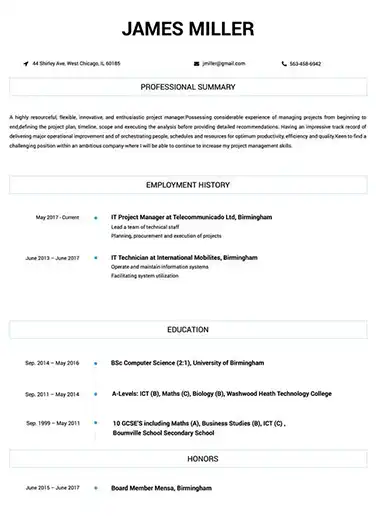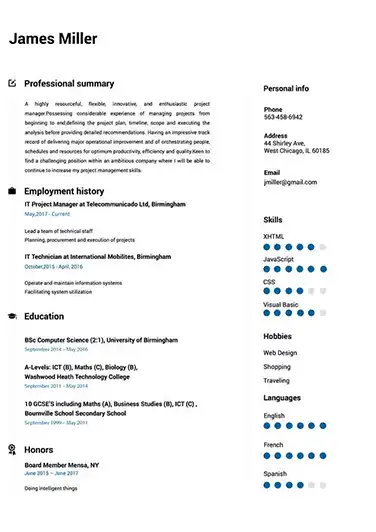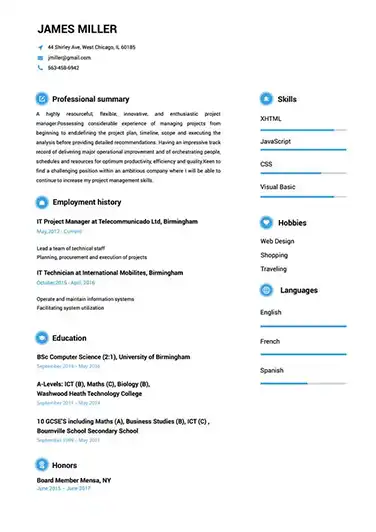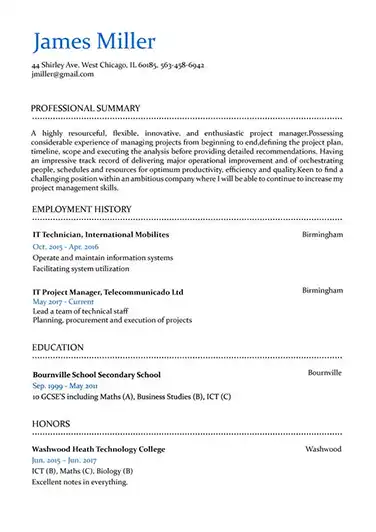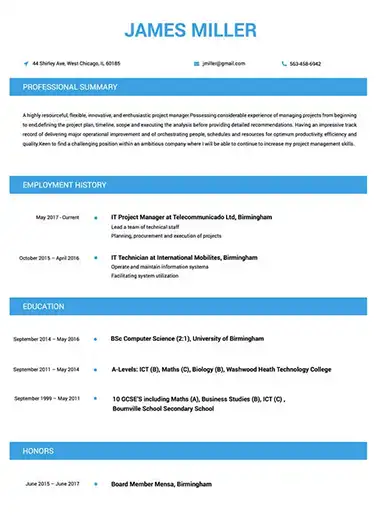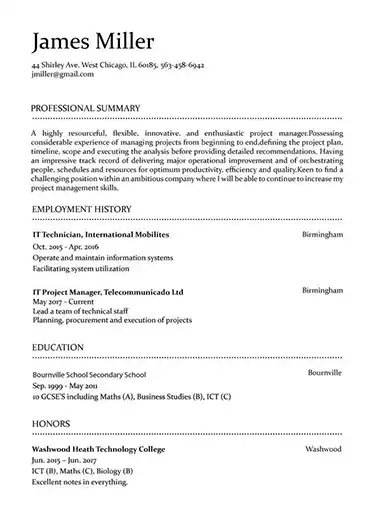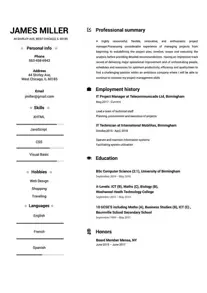 Use This Template
Use This Template
Build your resume in 15 minutes
Create an awesome resume that meets the expectations of potential employers with our selection of professional, field-tested resume templates.
videographer: Resume Samples & Writing Guide
beningram65@outlook.com
670-079-8367
Employment history
- Work within budgets and timelines
- Light and color correct footage
- Operate video cameras and other recording equipment
- Stay up-to-date on industry trends and technology
- Generate creative ideas for projects
- Edit raw video footage
- Edit raw video footage
- Work within budgets and timelines
- Generate creative ideas for projects
Education
Skills
Do you already have a resume? Use our PDF converter and edit your resume.
lewistodd31@outlook.com
838-739-2739
Employment history
- Generate creative ideas for projects
- Edit raw video footage
- Manage and organize video files
- Compose and frame shots
- Generate creative ideas for projects
- Capture footage for various projects
- Stay up-to-date on industry trends and technology
- Work with producers, directors, and other crew members
- Light and color correct footage
Education
Skills
andersonvirginia@inbox.com
996-788-8759
Professional Summary
Employment history
- Work within budgets and timelines
- Operate video cameras and other recording equipment
- Work with producers, directors, and other crew members
- Generate creative ideas for projects
- Light and color correct footage
- Work within budgets and timelines
- Compose and frame shots
- Work within budgets and timelines
- Work with producers, directors, and other crew members
Education
Skills
andrewyates@hotmail.com
824-946-4238
Employment history
- Capture footage for various projects
- Work within budgets and timelines
- Light and color correct footage
- Work with clients to develop concepts and ideas
- Ensure that all projects adhere to technical and quality standards
- Compose and frame shots
- Operate video cameras and other recording equipment
- Generate creative ideas for projects
- Collaborate with other creatives on projects
Education
Skills
francisnelson1@gmail.com
672-917-7192
Employment history
- Operate video cameras and other recording equipment
- Work with producers, directors, and other crew members
- Collaborate with other creatives on projects
- Stay up-to-date on industry trends and technology
- Operate video cameras and other recording equipment
- Work with producers, directors, and other crew members
- Light and color correct footage
- Work within budgets and timelines
- Operate video cameras and other recording equipment
Education
Skills
Not in love with this template? Browse our full library of resume templates
videographer Job Descriptions; Explained
If you're applying for an videographer position, it's important to tailor your resume to the specific job requirements in order to differentiate yourself from other candidates. Including accurate and relevant information that directly aligns with the job description can greatly increase your chances of securing an interview with potential employers.
When crafting your resume, be sure to use action verbs and a clear, concise format to highlight your relevant skills and experience. Remember, the job description is your first opportunity to make an impression on recruiters, so pay close attention to the details and make sure you're presenting yourself in the best possible light.
videographer/editor
- Determine project goals, locations, and equipment needs by studying assignments and consulting with clients or our team.
- Create various of short films, advertisements for clients, filming events, and making recaps.
- Take video of individuals, families, and small groups.
- Take a candid shots
videographer
- Created a 60 second film revolving around a personal passion
- Composed music to serve as the score of the short film.
- Travelled to Mt. Batulao in Nasugbu, Batangas and filmed on location
- Film in a non-intrusive manner to not disrupt ongoing events or live productions.
videographer
- Filming&Editing weddings, commercials and documentary films.
- Working with lights.
- Setting up frame light.
- Setting up sound.
- Setting up dollys, racks, gliders,sliders, gimbals.
- Working in different conditions such as hot sunny days and cold rainy evenings.
videographer
- promotional/commercial
- music videos
- corporate
- documentary
videographer
- Music videos
- kickstarter videos
- TV commercials
- Testimonials
- Product videos
videographer/editor Job Skills
For an videographer/editor position, your job skills are a key factor in demonstrating your value to the company and showing recruiters that you're the ight fit for the role. It's important to be specific when highlighting your skills and ensure that they are directly aligned with the job requirements, as this can greatly improve your chances of being hired. By showcasing your relevant skills and experience, you can make a compelling case for why you're the best candidate for the job.
How to include technical skills in your resume:
Technical skills are a set of specialized abilities and knowledge required to perform a particular job
effectively. Some examples of technical skills are data analysis, project management, software proficiency,
and programming languages, to name a few.
Add the technical skills that will get hired in your career
field with our simple-to-use resume builder. Select your desired resume template, once you reach the skills
section of the builder, manually write in the skill or simply click on "Add more skills". This will
automatically generate the best skills for your career field, choose your skill level, and hit "Save &
Next."
- Video Editing
- Videography
- Cinematography
- Video Production
- Lighting
- Motion Graphics
- Camera Operation
- Editing Software
- Adobe Creative Suite
- After Effects
- 3D Animation
- Audio Production
- Audio Editing
- Color Grading
- Storyboarding
- Visual Effects
- Directing
- Scriptwriting
- Digital Compositing
- Storytelling.
How to include soft skills in your resume:
Soft skills are non-technical skills that relate to how you work and that can be used in any job. Including
soft skills such as time management, creative thinking, teamwork, and conflict resolution demonstrate your
problem-solving abilities and show that you navigate challenges and changes in the workplace
efficiently.
Add competitive soft skills to make your resume stand-out to recruiters! Simply select
your preferred resume template in the skills section, enter the skills manually or use the "Add more skills"
option. Our resume builder will generate the most relevant soft skills for your career path. Choose your
proficiency level for each skill, and then click "Save & Next" to proceed to the next section.
- Communication
- Interpersonal
- Leadership
- Time Management
- Problem Solving
- Decision Making
- Critical Thinking
- Creativity
- Adaptability
- Teamwork
- Organization
- Planning
- Public Speaking
- Negotiation
- Conflict Resolution
- Research
- Analytical
- Attention to Detail
- Self-Motivation
- Stress Management
- Collaboration
- Coaching
- Mentoring
- Listening
- Networking
- Strategic Thinking
- Negotiation
- Emotional Intelligence
- Adaptability
- Flexibility
- Reliability
- Professionalism
- Computer Literacy
- Technical
- Data Analysis
- Project Management
- Customer Service
- Presentation
- Written Communication
- Social Media
- Troubleshooting
- Quality Assurance
- Collaboration
- Supervisory
- Risk Management
- Database Management
- Training
- Innovation
- Documentation
- Accounting
- Financial Management
- Visualization
- Reporting
- Business Acumen
- Process Improvement
- Documentation
- Relationship Management.
How to Improve Your videographer/editor Resume
Navigating resume pitfalls can mean the difference between landing an interview or not. Missing job descriptions or unexplained work history gaps can cause recruiters to hesitate. Let's not even talk about the impact of bad grammar, and forgetting your contact info could leave your potential employer hanging. Aim to be comprehensive, concise, and accurate.
Employment history
- Edit raw video footage
- Work with producers, directors, and other crew members
- Generate creative ideas for projects
- Capture footage for various projects
- Manage and organize video files
- Work within budgets and timelines
Education
Skills
Include your Contact Information and Job Descriptions
Missing job descriptions lessens your chances of getting hired.
Key Insights- Employers want to know what you've accomplished, so make sure to include descriptions for all of your previous jobs.
- Keep job descriptions short but don't just list your jobs.
- Never copy-paste a job description to post on your resume. Get inspired and use tools to help you write customized descriptions.
How to Optimize Your videographer/editor Resume
Keep an eye out for these resume traps. Neglecting to detail your job roles or explain gaps in your career can lead to unnecessary doubts. Grammar blunders can reflect negatively on you, and without contact information, how can employers reach you? Be meticulous and complete.
walkerpaul59@inbox.com
615-461-4207
Employment history
- Prepare storyboard's and script's
- Compose's and frame shot's
- Capture's footage for variou's project's
- Stay up-to-date on industry trends and technologys
- Prepare storyboards and script's
- Work with producers, director's, and other crew member's.
- Staay up-to-date on industry trends and technolgy
- Prepare storyboardd and scriptts
- Lightt and color correct footagge
Education
Skills
Correct Grammar and Address Gap Years in Your Resume
Don't leave unexplained gaps in your work history.
Key Insights- When explaining gaps in your employment section, start by being honest.
- Elaborate on the gap and show that you never stopped learning.
- Explain and elaborate any gap in your work history by highlighting new skills.
videographer/editor Cover Letter Example
A cover letter can be a valuable addition to your job application when applying for an videographer/editor position. Cover letters provide a concise summary of your qualifications, skills, and experience, also it also gives you an opportunity to explain why you're the best fit for the job. Crafting a cover letter that showcases your relevant experience and enthusiasm for the Accounts Payable role can significantly improve your chances of securing an interview.
Ingram beningram65@outlook.com
670-079-8367
414 Langley Lane, Charlotte, IA
52731
Mountain View, California
To Whom It May Concern
I am excited to apply for the Lead Videographer role at Google. As a highly skilled Videographer, I am confident that I have the necessary experience and abilities to make a valuable contribution to your organization.
As someone who has faced challenges in various areas of my life and has overcome them, I am confident in my ability to adapt and thrive in any environment. I have developed a reputation for being a collaborative team player and an effective problem solver, which has been instrumental in my career's success. With my experience and passion for Art & Creative & Design, I am excited to apply my skills to this role and contribute to your organization's growth and success.
I cannot stress enough how thrilled I am about the chance to join a team of like-minded individuals who share my values and passion for this amazing field. Thank you for considering my application and I hope for the chance to work together.
Kindest regards,
Ben Ingram
670-079-8367
beningram65@outlook.com
Ben Ingram
Showcase your most significant accomplishments and qualifications with this cover
letter.
Personalize this cover letter in just few minutes with our user-friendly tool!
Related Resumes & Cover Letters

Build your Resume in 15 minutes
Create an awesome resume that meets the expectations of potential employers with our selection of professional, field-tested resume templates.

